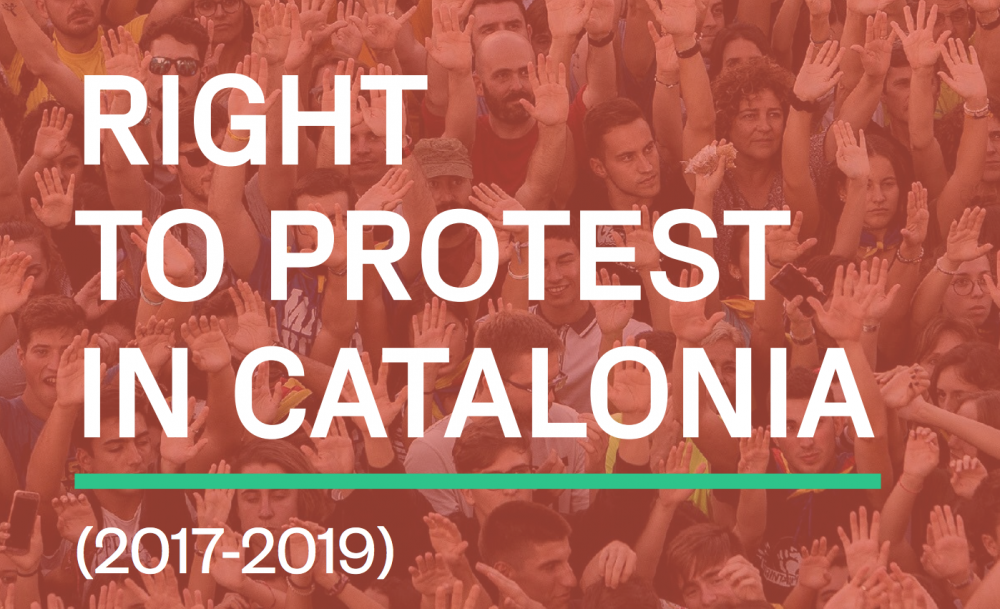REPORT | Right to protest in Catalonia

Since the Area Right to Protest of Irídia we have elaborated the Report The right to protest in Catalonia, with the support of the Office of Civil and Political Royalties of the Generality of Catalonia.
The raison d’être of this report is the conductive nature of the right to protest, since it is through protest that other rights can be exercised, claimed and defended. This nature, which is essential in any democratic and plural society. However, public powers often perceive protest as a threat, and only treat it as a public order issue. It is precisely in these situations when the highest number of instances of abuse or disproportional use of force are encountered. This has been claimed on many occasions by human rights Special Rapporteurs, and the United Nations Human Rights Council itself.
Així doncs, el reconeixement, la protecció i la garantia del dret a la protesta és una obligació per part de totes les administracions públiques, i és, també, un bon indicador de l’estat de salut d’una democràcia. Estat de salut que, malauradament, no és el desitjable actualment, com a conseqüència del greu retrocés en la garantia dels drets a la llibertat d’expressió, a la llibertat d’informació, així com al dret de reunió i manifestació tant en el marc de l’Estat espanyol com a Catalunya, així com també en el context europeu i internacional.
Therefore, acknowledging, protecting and guaranteeing the right to protest is an obligation for all public administrations and it is also an important indicator of a democracy’s state of health. Unfortunately, many modern democracies are currently ailing as a consequence of a general tendency towards the repealing of such rights. The right to freedom of speech, freedom of information and freedom of assembly are at stake both in Spain and Catalonia, as well as in European and international contexts.
For this reason, this report looks into the right to protest and its current state internationally as well as within Spain. It will then focus on the analysis of the right of protest in Catalonia between 2017 and 2019.
El present informe pren com a referència, més enllà del context sociopolític actual, la tasca desenvolupada pel Servei d’Atenció i Denúncia en situacions de Violència Institucional (SAIDAVI) d’Irídia. Això no obstant, hi incorpora també dades i posicionaments d’altres organitzacions i institucions públiques sobre la matèria, per tal de tenir una mirada àmplia sobre la qüestió.
In addition to the current social and political context, this report is based on the work of SAIDAVI (Service of Attention and Denunciation in situation of Institutional Violence) and it also includes data and opinions of other organizations and public institutions in order to broaden the point of view on this topic.
Una societat mobilitzada i amatent per a la defensa dels seus drets és un pilar fonamental per a qualsevol democràcia; és el que s’anomena la garantia social dels drets. Però no és pot oblidar que les obligacions en el reconeixement, protecció, respecte i garantia dels drets humans recauen en primer lloc en les institucions públiques. Especialment en moments com l’actual, d’una forta regressió en els drets i llibertats.
A participative society that fights to guarantee its rights is a fundamental mainstay in any democracy. It is called social guarantee of rights. However, we can’t forget that the obligation of acknowledging, protecting, respecting and guaranteeing human rights is the duty of public institutions.
Now more than ever, institutions have to have the will and decisiveness needed in order to revert this tendency; they need rigorous public policies based on guaranteeing rights. The aim of this report is to contribute to developing those public policies, using work done by an organization that specialises in civil and political rights, and more specifically, in the impacts and consequences that institutional violence generates, and how to face it from the point of view of rights and penal guarantees.
